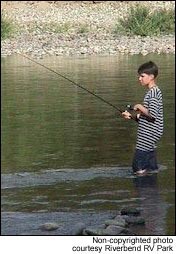forum
library
tutorial
contact

Every Drop of Water Precious in Central Washington
by StaffEnvironmental News Network, June 26, 2001
|
the film forum library tutorial contact |

|
Every Drop of Water Precious in Central Washingtonby StaffEnvironmental News Network, June 26, 2001 |
 In a move to save salmon, steelhead and bull trout
listed for protection under the federal Endangered
Species Act, and also to help save water for small
farmers, the state of Washington and the Methow
Valley Irrigation District have made a deal over the
contentious issue of water use.
In a move to save salmon, steelhead and bull trout
listed for protection under the federal Endangered
Species Act, and also to help save water for small
farmers, the state of Washington and the Methow
Valley Irrigation District have made a deal over the
contentious issue of water use.
Leaky irrigation laterals will be replaced with pressurized pipes beginning this irrigation season as the result of an agreement reached this week between the Methow Valley Irrigation District, the Bonneville Power Administration, and the Washington Department of Ecology.
The new pressurized pipes will serve between 800 and 1,000 irrigable acres in the upper half of the Methow Valley in north central Washington. The properties served are mostly small family farm operations, 10 to 20 acres in size.
The agreement helps to resolve long standing concerns about wasted water, reduced stream flows and threatened endangered fish.
"Converting to pipes will save millions of gallons of water and will greatly improve conditions in the Methow and Twisp rivers," said Linda Hermeston, Bonneville Power Administration (BPA) project manager. "It's really a win-win situation for everyone."
Federal and state money targeted for salmon restoration will be used to fund the project. BPA's share will total some $475,000. The state Department of Ecology's portion will account for $142,500 of the project.
But the farmers in the Methow Valley believe that their area has been turned into the test case for the taking of established water rights through the Endangered Species Act. Their position is that irrigators in Okanogan County have been denied their state water rights under the guise of salmon recovery.
Last year the National Marine Fisheries Service went to federal court in Spokane, Washington to try to shut down the Methow Valley's largest irrigation district. The federal agency claimed the district was killing endangered fish by filling its irrigation canals and requested a court order to shut off water diversions from the Methow and Twisp rivers.
Irrigation began in the Methow Valley in the 1880s, when fish were plentiful and no one thought about saving them. But valley development and construction of hydroelectric dams in the region have depleted most of those runs of salmon and steelhead.
This year it's Methow Valley's turn to seek court relief. Okanogan County and several Methow basin irrigators filed suit June 19 in federal district court claiming federal endangered species decisions have illegally taken local water rights.
The county argued that Endangered Species Act decisions established standards for streamflows that are below levels of more than 100 years ago before irrigation began in the basin.
The suit names as defendants National Marine Fisheries Service, U.S. Fish and Wildlife Service and the Forest Service.
Meanwhile, some $510,000 has been earmarked for the pressurized pipes project, the second phase of a long term effort to upgrade the irrigation system which is more than 90 years old. Last year, nearly half the district received authorization to convert to groundwater wells.
Yet irrigators are reluctant to convert to wells and pipes, partly because it would mean more scrutiny by the state Department of Ecology. More scrutiny means more battles over the amount of water an irrigator has rights to, said Dick Ewing, who heads a water planning group in the Methow.
More than $6 million in public funding has been available for five years to convert the Methow Valley Irrigation District ditch to a system of pressurized pipes and wells. But last July, the district was fined $55,000 for killing endangered Upper Columbia spring chinook and steelhead in irrigation ditches.
The fine prompted the district to sign a federal consent decree, in which it agreed to stop killing fish by 2002, or shut down. While the decree does not specifically order conversion of irrigation ditches, federal regulators say that is the best way to minimize harm to fish.
"This is the second step toward fully rehabilitating the district's rundown water delivery system," explained Bob Barwin, a water resources manager for the state agency. "Last year, more than 100 users opted to leave the district and were allowed to drill wells for irrigation if they wanted."
The Methow may be the region's first major battleground in what many of the area's farmers see as a water war, and they point out that similar irrigation practices can be found in arid regions throughout Eastern Washington, Oregon and Idaho.
learn more on topics covered in the film
see the video
read the script
learn the songs
discussion forum
